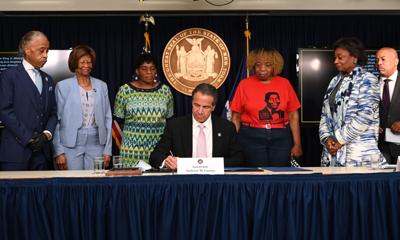NEW YORK — Every police agency across New York must reinvent its community policing strategies or forego state funding, Gov. Andrew Cuomo declared in an executive order Friday after signing 10 police reform bills into law, including publicizing law enforcement personnel records.
The governor signed the executive order, named the New York State Police Reform and Reinvention Collaborative, mandating all of the state’s roughly 500 law enforcement agencies, including the New York Police Department, to publicly meet with people in their communities and reinvent policing strategies.
Each police force statewide must develop a plan by April 1, 2021 — the state’s next budget deadline - to be eligible for state funding. The municipality that oversees the law enforcement agency must certify and adopt and enforce the plan as a local law.
“The protest taking place throughout the nation and in communities across New York in response to the murder of George Floyd illustrate the loss of community confidence in our local police agencies - a reality that has been fueled by our country’s history of police-involved deaths of black and brown people,” Cuomo said Friday during a coronavirus briefing at his Manhattan office. “Our law enforcement officers are essential to ensuring public safety - they literally put themselves in harm’s way every day to protect us. This emergency regulation will help rebuild that confidence and restore trust between police and the communities they serve by requiring localities to develop a new plan for policing in the community based on fact-finding and meaningful community input.”
Law enforcement must develop the plan considering recommendations from the head of the police agency and public comment. The plan must address the law enforcement agency’s use of force, crowd management, community policing, implicit bias awareness and de-escalation training, restorative justice practices, community outreach, a transparent citizen complaint procedure and other issues specific to each community.
“The only way we really solve this is to sit down at the table with the local community ... and get to the root of these issues,” the governor added. “...Get in a room and talk about it.”
Cuomo signed 10 police reform bills into law Friday the New York Legislature passed in three days this week as part of the state’s Say Their Name reform agenda. The reforms include publicizing law enforcement personnel records by repealing Section 50-a of the state’s Civil Rights Law, banning police from using chokeholds, criminalizing false race-based 911 reports and designating New York’s attorney general as an independent prosecutor for police-involved deaths of unarmed civilians.
Assembly Speaker Carl Heastie, D-83, and Senate Majority Leader Andrea Stewart-Cousins, D-35, negotiated the progressive legislation package with Cuomo and other Democrats in the Legislature’s majority for several days last week. Both lawmakers gave emotional statements about the historic reforms Friday before they were signed into law.
“’You can get killed just for living in your American skin,’” Stewart-Cousins said quoting Bruce Springsteen’s song “American Skin (41 shots)” inspired by the February 1999 New York City police shooting death of Amadou Diallo.
“We know this isn’t a cure,” she added of the Say Their Name reform. “We know that this is the beginning, but it’s nice to bring justice to a system that has long be unjust.”
The 10 bills as part of the state’s Say Their Name legislation passed this week with bipartisan votes.
“We have many Republicans voting for these bills because I think the true world has said enough is enough is enough,” Heastie said. “How much more bloodshed had to happen for the consciousness and the heart of this nation to finally open and say we need to do better?”
The Rev. and activist Al Sharpton, founder and president of National Action Network, also gave a statement Friday before Cuomo signed the legislation.
“Signing these bills is bringing about the change,” Sharpton said, adding he supported the governor’s police reform executive order.
“This is a model for where we ought to be dealing with 21st-century civil rights.”
The governor has repeatedly called for similar, sweeping criminal justice reform on the national level. On Friday, he reiterated Congress must address education inequality, affordable housing and child poverty with federal reforms.
“Today is about ‘enough is enough,’” Cuomo added. “...Talking is not enough.”
Democratic congressional leaders introduced the Justice in Policing Act of 2020 on Monday — comprehensive police reform legislation that would amend the federal criminal statute to prosecute police misconduct from “willfulness” to a “recklessness” standard; reforming qualified immunity so people are not entirely barred from recovering damages when police violate their constitutional rights.
The federal legislation would also create a National Police Misconduct Registry and require state and local law enforcement agencies to report use of force data disaggregated by race, sex, disability, religion and age. The bill includes police training and practices to end racial and religious profiling, mandating training on racial bias and the duty to intervene, banning no-knock warrants, banning chokeholds and carotid holds and changing the standard to evaluate law enforcement use of force.
New York lawmakers and congressional representatives continued steps toward legislation Tuesday to address the nationwide pattern of law enforcement brutality and improve the policing relationship with minority communities.
The Justice in Policing Act of 2020 makes lynching a federal crime under federal hate crime laws. The legislation was referred to the Judiciary, Armed Services and Energy and Commerce committees.
COVID-19 cases continue to surge in 23 states, with 15, including Texas, Arizona, Florida, California, Alabama, seeing record highs.
Virus hospitalizations continued their weeks-long decline to 1,898 patients Friday, down 144. The state saw 42 COVID-19 deaths Thursday, including 32 in hospitals and 10 in nursing homes. New York’s coronavirus fatalities have remained flat with 55 fewer in a 24-hour period for more than a week.
New York, the hardest-hit state, has the lowest coronavirus transmission rate in the nation, Cuomo said Friday, at 0.77%, which means one person who contracted the virus infects .77 other people, or fewer than one. A transmission rate over 1 signifies an outbreak.
Vermont has the nation’s highest COVID-19 transmission rate at 1.13%. South Carolina and Arizona residents are transmitting the virus at 1.08%, according to the governor’s office.
Cuomo reminded New Yorkers to watch their region’s daily testing results and to remain smart by wearing face masks or coverings in public and maintaining social distancing, or at least 6 feet, from others to prevent a second wave.
All essential workers and New Yorkers who attended a protest are eligible to receive a free coronavirus diagnostic test. To schedule a COVID-19 at one of more than 800 testing sites statewide, visit coronavirus.health.ny.gov.
To see where each region stands on reopening and the complete county breakdown of COVID-19 cases and deaths statewide, view the COVID-19 map and tracker at hudsonvalley360.com/site/covid19.html.
Johnson Newspapers 7.1









